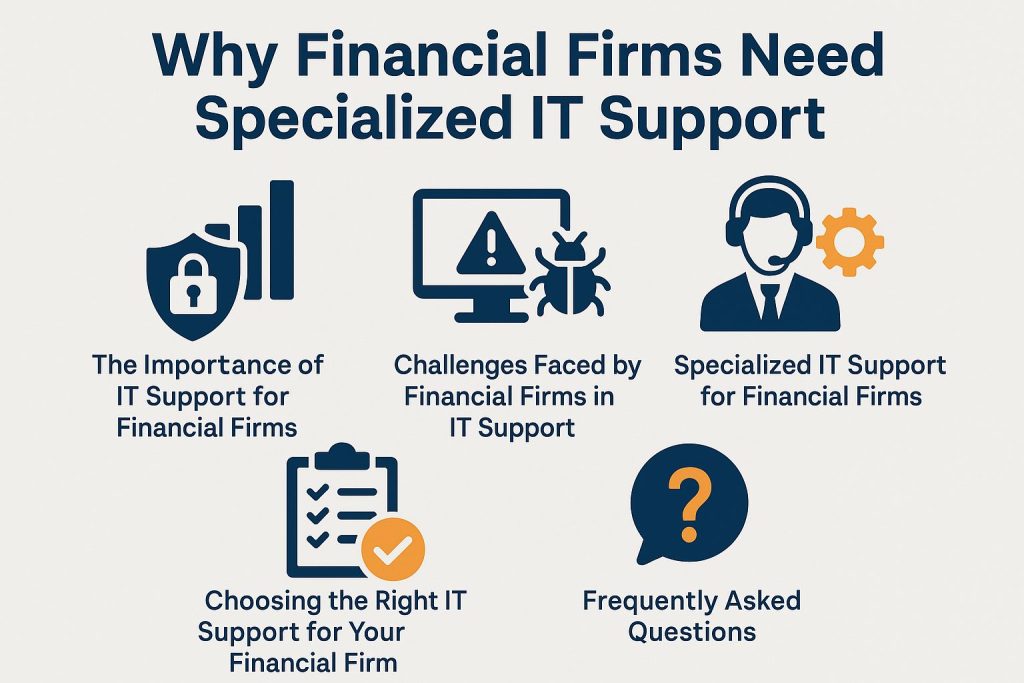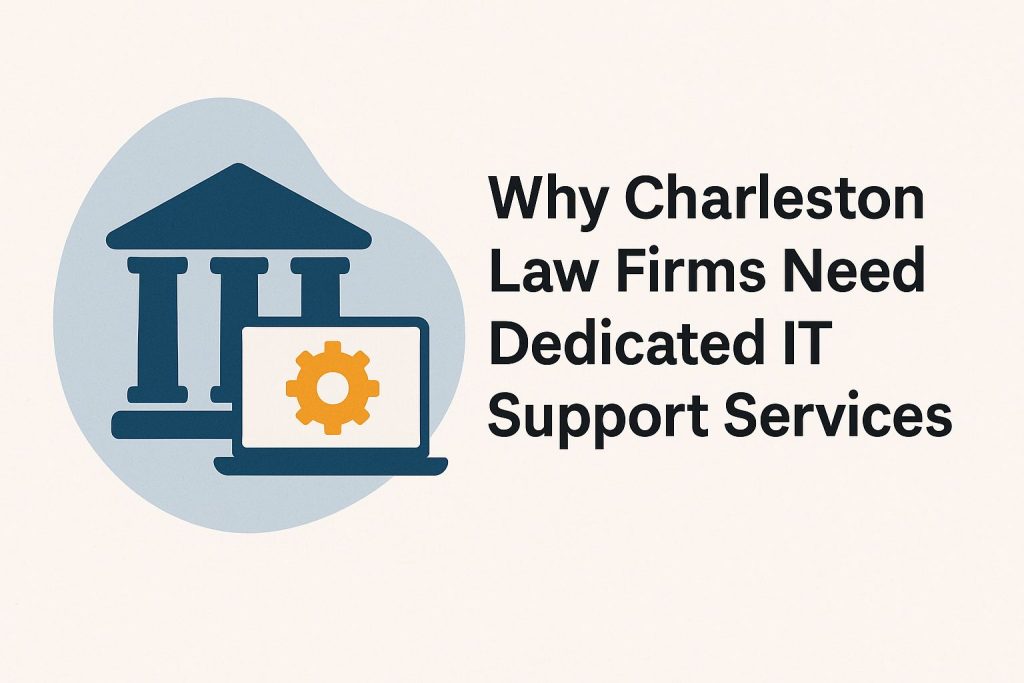Cybersecurity for Financial Firms in Charleston: A Practical Guide

Financial firms face many cybersecurity threats today. These threats can compromise sensitive information and erode client trust. This article outlines steps financial firms can take to improve cybersecurity. It includes best practices and strategies for effective protection. It also covers compliance and regulatory requirements for financial firms in Charleston. This ensures they are prepared to safeguard their business.
Why Cybersecurity is Important for Financial Firms in Charleston
Today, cybersecurity is essential for financial firms. It protects sensitive financial data from threats like malware, phishing attacks, and data breaches. Cybercriminals often target these firms because they manage substantial digital assets. It is vital for them to adopt strong data protection measures and comply with regulations.
A security breach can cause reputational damage and financial loss. This highlights the need for a strong cybersecurity framework to ensure effective incident response for financial institutions.
Cyber threats are becoming more sophisticated. Financial firms must be vigilant and proactive. The impact of a breach goes beyond financial losses. It can lead to regulatory penalties and a loss of customer trust, which are hard to recover.
Compliance with industry-specific regulations such as PCI-DSS and GDPR helps protect sensitive information and shows a commitment to client interests and privacy laws. By using advanced threat detection and regular security audits, these organizations can prepare for new risks. This leads to a more resilient operational environment.
Common Cybersecurity Threats for Financial Firms
Financial firms face many cybersecurity threats that jeopardize operations and undermine client trust. These threats include:
- Phishing attacks, wherein malicious actors deceive employees into disclosing sensitive information;
- Malware, which can disrupt business continuity;
- Ransomware, which poses a risk by encrypting critical data until a ransom is paid.
Furthermore, identity theft represents a substantial threat, as cybercriminals frequently target personal information to perpetrate fraud. Consequently, comprehending these threats is essential for formulating effective security protocols and safeguarding digital assets and secure transactions. It is crucial to address common IT vulnerabilities as firms grow, as mentioned in our resource on avoiding IT mistakes in expanding businesses, to maintain robust security systems and protect client trust.
Types of Cyber Attacks and Their Impact on Information Security
Cyber attacks come in many forms. Each has different methods and consequences for financial firms. One common type is phishing. Phishing attacks exploit human vulnerabilities to gain unauthorized access to sensitive information, impacting data security measures.
Malware attacks can compromise systems. They may lead to data breaches that expose confidential financial data. Ransomware is a severe threat. It can incapacitate an organization until a ransom is paid. This highlights the need for strong endpoint protection and cyber resilience. A thorough understanding of these different types of attacks is essential for implementing effective incident response strategies and safeguarding critical assets.
Denial-of-service attacks overwhelm a firm’s network, rendering its services unavailable to legitimate users, which erodes customer trust and leads to financial losses, requiring strong IT infrastructure. Advanced persistent threats (APTs) are long-term intrusions. They allow cybercriminals to gather intelligence over time, posing risks to sensitive investment strategies and proprietary data.
For instance, the 2017 Equifax breach showed the serious consequences of weak security practices. Hackers exploited a vulnerability and stole personal and financial information from millions. By analyzing such case studies, financial firms can gain a clearer understanding of the diverse threat landscape and the imperative need for comprehensive security protocols.
Steps to Improve Cybersecurity for Financial Firms
.jpg_01.jpeg)
To improve cybersecurity, financial firms need a multi-faceted approach. This includes risk management, data protection, vulnerability assessment, and a strong cybersecurity framework.
Organizations should regularly assess vulnerabilities and conduct penetration testing. This helps find weaknesses in their systems. They should also implement strong security measures, like firewalls and encryption. For an extensive analysis of effective security practices, our IT Security Charleston guide provides a comprehensive overview of cybersecurity services.
Employee training is vital. Human errors often cause incidents. Cultivating a culture of cybersecurity awareness can significantly reduce risks.
Establishing a clear incident response plan helps firms respond quickly to security breaches. This is crucial for maintaining business continuity.
Best Practices and Strategies for Protection
Financial firms must adopt best practices and strategies for cybersecurity. This is essential to defend against evolving cyber threats and ensure secure coding. Implementing robust security protocols, such as multi-factor authentication and regular security audits, can significantly enhance an organization’s defense mechanisms. Ensuring compliance with industry regulations and standards is crucial for mitigating third-party risks associated with vendors and partners, and maintaining regulatory compliance. For those interested in a comprehensive approach, you might find our guide on Cybersecurity Best Practices invaluable.
Organizations should establish effective incident management processes. This allows them to respond quickly to security incidents and reduce potential damages.
In addition to technical measures, financial institutions must create a security-aware culture. They should provide regular training that focuses on recognizing phishing attempts and practicing safe online behaviors.
Proactive risk assessments can help identify vulnerabilities before exploitation. This allows firms to implement targeted improvements. Utilizing encryption for data at rest and in transit is critical for safeguarding sensitive information.
Integrating these cybersecurity practices protects the organization and builds client trust. This lays the groundwork for long-term success in a digital landscape and improves information assurance.
Compliance and Regulations for Financial Firms in Charleston and the Financial Sector
Compliance with regulations is critical for financial firms in Charleston. It ensures adherence to both federal and state financial laws. These regulations protect sensitive financial data. They require robust cybersecurity policies to guard against breaches.
Firms must engage in data governance practices, including IT governance. This helps maintain compliance and reduce risks associated with non-compliance, which can lead to penalties. Understanding these regulations is essential for securing operational integrity and client trust in the financial sector.
Key Requirements and Guidelines to Follow
.jpg_10.jpeg)
Financial firms must follow key requirements and guidelines. This helps them maintain a proactive cybersecurity posture and comply with regulations, including cybersecurity insurance. These obligations encompass implementing security measures to protect digital assets, conducting regular risk assessments to identify vulnerabilities, and establishing a security governance framework that clearly defines roles and responsibilities within the organization.
Plus these foundational steps, organizations should develop a strong incident response plan. This plan helps them act quickly during a security breach and ensures disaster recovery. Ongoing employee training strengthens this strategy. Cybersecurity awareness programs equip staff to recognize potential threats.
Financial institutions must stay alert to new cyber threats. They should use real-time monitoring, share threat intelligence, and collaborate with industry peers. Building a culture of adaptability and resilience is essential. It helps firms comply with current regulations and prepare for future cybersecurity challenges in the ever-evolving cybersecurity landscape and digital security.
Frequently Asked Questions
What is cybersecurity and why is it important for financial firms in Charleston?
Cybersecurity protects computer systems, networks, and data. It prevents unauthorized access, theft, or damage. It is important for financial firms in Charleston to have strong cybersecurity protocols, including security policies, in place to safeguard sensitive financial information and maintain trust with clients.
What are some common cyber threats that financial firms in Charleston should be aware of?
.jpg_11.jpeg)
Common cyber threats include phishing scams, ransomware, and insider threats. Firms in Charleston should be aware of these. It is crucial for firms to stay updated on the latest cyber threats and have proper defenses in place to prevent and mitigate potential attacks.
How can financial firms in Charleston stay compliant with cybersecurity regulations?
To stay compliant, financial firms should conduct regular risk assessments. They must implement strong security measures and keep up to date with compliance changes. A practical guide to IT infrastructure and IT governance is crucial. It is also important to have a designated compliance officer who is responsible for ensuring the firm’s adherence to regulations and managing compliance audits effectively.
What are some best practices for cybersecurity, including mobile security and cloud security, that financial firms in Charleston should follow?
Best practices include using complex, unique passwords, backing up data regularly, and limiting access to sensitive information. Firms should also educate employees on cybersecurity awareness and protocols. Regular user training and updates to software should be prioritized to prevent financial crime and phishing prevention.
What should financial firms in Charleston do in the event of a cyber attack or other cybersecurity incidents?
If a cyber attack occurs, firms should have a clear incident response plan. This plan helps them quickly and effectively reduce damage. This may include disconnecting affected systems, notifying clients and authorities, and conducting a thorough investigation to prevent future attacks. Involving cyber insurance and cyber liability considerations, along with vulnerability management, can aid in cyber risk management and reputation management.
How can financial firms in Charleston ensure the security of their clients’ personal and financial information and protect against security breaches?
Firms can protect clients’ personal and financial information by using strong data encryption. They should monitor for suspicious activity and maintain strict data privacy policies and privacy protection measures in place. It is also important for firms to regularly educate clients on how to protect their own information when conducting financial transactions online, using secure payment systems and authentication mechanisms for secure communication and prevention of social engineering attacks.




